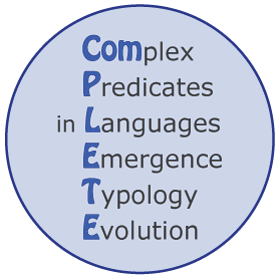
ComPLETE {“Complex Predicates in Languages: Emergence, Typology, Evolution”} is an international project dedicated to the study of complex verbal predicates across the world. It is funded by the ANR (France) and the DFG (Germany), for three years (April 2022‒June 2025).
ComPLETE involves a consortium of 35 linguists and engineers from both countries; it is led by Martine Vanhove (CNRS–LLACAN) and Alexandre François (CNRS–LATTICE) in France, and by Walter Bisang and Andrej Malchukov (Universität Mainz) in Germany.
[→ about us]
The ComPLETE project
Although the term “complex predicates” is well established in linguistics, it is still a theoretical challenge. Complex predicates are generally defined as sequences of phonologically independent words, which together behave like a single predicate; but this definition covers a broad range of constructions whose boundaries are not clear. For that reason, we focus on verb-based complex predicates (VCP), defined as grammatical constructions serving as a predicate to a single subject, and involving at least two lexical items belonging, synchronically or diachronically, to the class of verbs. This definition includes serial verbs, converbs, light verbs and auxiliaries: these share certain functional properties and sometimes follow parallel historical dynamics. The “ComPLETE” project aims to carry out a systematic analysis of complex predicates on formal and semantic grounds, from the perspectives of synchrony, diachrony and areality.
As the available data is limited to certain language families and geographic areas, ComPLETE will base its analyses on a wide range of language families, in line with the expertise of the participants. First, the project will develop a typological questionnaire for guaranteeing cross-linguistic comparability. Based on the answers provided by linguistic experts, three research questions will be addressed:
- Can we identify cross-linguistic dependencies between the semantic domains associated with complex predicates (e.g. tense-aspect-mood, spatial orientation) and specific formal properties?
- How can we model the diachronic evolution of these structures, in terms of grammaticalization and lexicalization?
- How are complex predicates distributed across the world’s linguistic areas or language phyla?
The core teams from France and Germany are composed of four linguists with a long experience in linguistic fieldwork, cross-linguistic comparison and typology. Each country will recruit one PhD student and one postdoctoral researcher: in Germany, the postdoc (50%) will be responsible for coordination; in France, s/he will conduct a synthesis on a linguistic area, and bring in expertise in statistics. Together, they will collaborate with computational engineers to build a database.
The ComPLETE team will also receive contributions from 14 full-fledged participants and 14 external partners – linguists with expertise on a large number of language families, and on a wide range of theoretical issues. At the end of three years, the ComPLETE project will present a joint volume with a position paper and chapters by all contributors. Our database and analyses will be publicly accessible online through the open-source platform of Cross-Linguistic Linked Data (CLLD).

 Full description of the
Full description of the